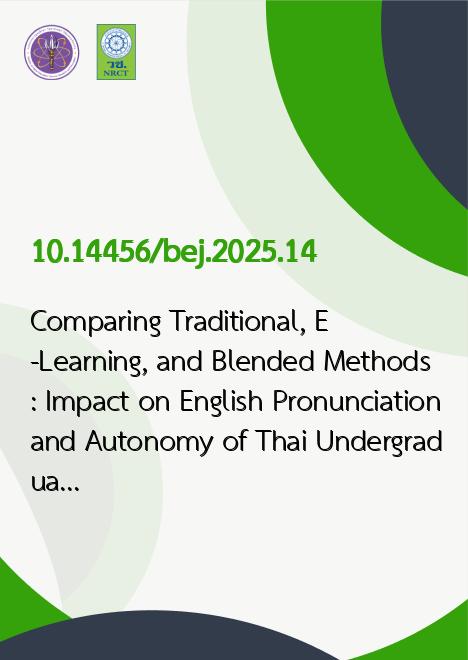
|
Comparing Traditional, E-Learning, and Blended Methods: Impact on English Pronunciation and Autonomy of Thai Undergraduates |
|---|---|
| รหัสดีโอไอ | |
| Creator | Banjob Piyamat |
| Title | Comparing Traditional, E-Learning, and Blended Methods: Impact on English Pronunciation and Autonomy of Thai Undergraduates |
| Publisher | Ph.D. Program in English Language Teaching (ELT), Faculty of Humanities and Social Sciences, Buriram Rajabhat University |
| Publication Year | 2568 |
| Journal Title | BRU ELT JOURNAL |
| Journal Vol. | 3 |
| Journal No. | 2 |
| Page no. | 201-216 |
| Keyword | autonomous learning, blended learning, English pronunciation, Thai undergraduates |
| URL Website | https://so14.tci-thaijo.org/index.php/bru_elt_journal/index |
| Website title | https://so14.tci-thaijo.org/index.php/bru_elt_journal/article/view/1851 |
| ISSN | 2822-1311 |
| Abstract | This research article aims to the effectiveness of traditional face-to-face, e-learning and Blended Learning in promoting independent English pronunciation learning of 75 students in a Thai university. There were three groups of participants in the experiment, who were purposively placed in a 15-week intervention reflecting the organizational curriculum of the university in English phonology in a quasi-experimental manner. Data were collected from pre-post tests, learner autonomy questionnaire and semi-structured interviews. There were significant group differences after training in quality of pronunciation (p <. 001) and the results of the combined teaching group were significantly better than those of the other two groups. In addition, the degree of learner autonomy was significantly the greatest in the Blended Learning group. Interview data highlighted benefits such as improved self-discipline and self-efficacy in both online and offline learning environments. The results powerfully support autonomous learning, and Blended Learning is proposed as an effective pedagogical approach for teaching phonetics in Thai higher education. |